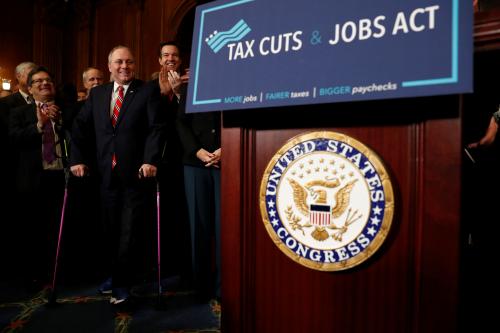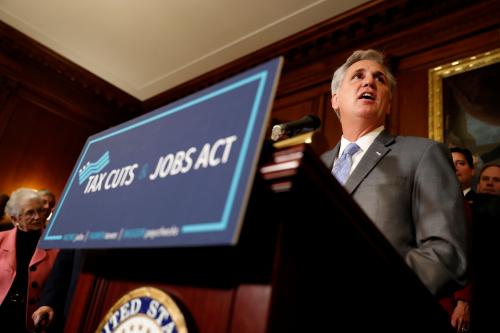This piece originally appeared in Fortune on November 2, 2017.
Today on Capitol Hill, House GOP lawmakers unveiled the Tax Cuts and Jobs Act and, in the process, doubled down on their message that corporate tax cuts will spur growth, raise wages, and benefit the American worker.
The proposal, which touches nearly every aspect of America’s tax system, would permanently and immediately lower the corporate tax rate from 35% to 20% while also delivering other corporate tax breaks.
Proponents of corporate tax cuts argue that they will enable employers to create more jobs. Opponents see no basis for this assumption based on past experience with tax cuts under presidents Ronald Reagan and George W. Bush.
Instead of simply hoping that such tax cuts will trickle down to the broader public, why not make “trickle down” a necessary condition for businesses to receive lower taxes?
One way to accomplish this is to amend a current provision in the tax code that allows executives to deduct any yearly income they make over $1 million if they meet certain performance standards. The amendment could deny this deduction to companies unless they also make it available to all of the workforce. Such incentives encourage companies to take a second look at how they compensate their employees.
A second way to deal with the trickle-down problem would be to provide a tax credit for employee training. Government training programs have thus far been small and not been very effective; employer efforts would function much better.
I just returned from a field trip to Kentucky where a coalition of employers is partnering with a community college to train workers to be technicians in their manufacturing plants. The collaborators have designed a smart program in which apprentices work for sponsoring employers three days a week and attend customized training at a community college for two days. It’s a smart program that is supplying employers with desperately needed skilled labor. A tax credit for such programs could go a long way.
This vision of inclusive capitalism should have bipartisan support. Instead of relying on government training programs or requiring low-wage workers to turn to government handouts that are expensive and demeaning, businesses would help workers gain the skills that they need and offer pay packages that better reflect their contributions.
These ideas won’t solve all of our problems, of course, and we should be skeptical of adding additional provisions to a tax code that badly needs to be simplified. But these and similar ideas deserve a hearing. They do not rely on government to retool the labor force or improve our lagging productivity growth. Instead they call on businesses to play a bigger role, but with a nudge from a reformed tax system.
This would move us toward a system of more inclusive capitalism—encouraging economic growth but making sure its benefits are more widely shared.
The Brookings Institution is committed to quality, independence, and impact.
We are supported by a diverse array of funders. In line with our values and policies, each Brookings publication represents the sole views of its author(s).







Commentary
Op-edCorporations will love the GOP tax plan. Should everyone else?
November 3, 2017